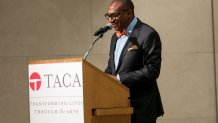
The Dallas Chamber Symphony is one of TACA’s 2020 annual operating grant recipients.
According to Americans for the Arts’ nationwide impact survey, the arts and culture sector lost $3.6 billion by March 27 as arts organizations canceled events due to the coronavirus pandemic. As these non-profit organizations struggle to pay staff and cover operational costs while their doors are closed indefinitely, government entities and local arts funders are scrambling to support the industry.
Included in the $2 trillion Coronavirus Aid, Relief and Economic Security Act (CARES) is $300 million dollars for the arts and cultural industry, administered by the National Endowment for the Arts (NEA), National Endowment of Humanities and the Institute of Museum and Library Services. The NEA will distribute $75 million nationally. Normally, the NEA’s grants are project-based. These funds are specifically for operations.
“With the agency’s experience in disaster recovery, economic crises mitigation, and distributing relief funds, the Arts Endowment will deliver assistance to help retain as many jobs as possible and keep the doors open to the thousands of organizations that add value to America’s economy and the creative life of our communities,” Mary Anne Carter, NEA’s chairman, said.
In 2017, the industry contributed $877 billion to the US economy and five million wage and salary workers were employed in the arts and culture sector, earning $405 billion.
“While this support is of great value, my concern is that it isn’t enough to keep many small and medium-sized arts organizations afloat when their audiences can’t reach them, and their doors will likely have been shuttered for weeks and even months,” Robert L. Lynch, Americans for the Arts President and CEO, said.
Jennifer Scripps, Director of City of Dallas Office of Arts and Culture (OAC), is encouraged by the federal funding. “It seems like the NEA did quite well. Their annual budget has bounced around $150 million per year for the last few years, so this is in effect a relief package of 6 months’ budget,” Scripps said. “We also assume that the arts organizations will also be able to find other parts of the bill (small business relief and community support funding) to also apply for support from.”
Arts organizations have funding contracts with the city, with funds distributed throughout the year. The OAC expedited the second payment which represents 40% of organizations’ contract. The OAC is working with individual artists whose city-funded projects have been postponed or canceled.

The Dallas City Council showed continued support, approving $3.188 million in funding for the Latino Cultural Center and $3.529 million for repairs to the Meyerson Symphony Center. The Cultural Plan, which the council unanimously approved in 2018, helps the city understand the current critical needs of the arts community. “In terms of serving the community, as much as the big guys are hurting, the little guys are too,” Scripps said.
The Scene
The OAC has been working with TACA (The Arts Community Alliance) during the development of its Emergency Relief Fund. Terry D. Loftis, TACA’s Carlson President and Executive Director, recognized the need as the virus spread. “My board chair and I had conversations about this a month ago and then three weeks ago, I started making exploratory calls,” Loftis said.
This fund is a team effort. The fund’s supporters include The Eugene McDermott Foundation, the Donna Wilhelm Family Fund, Hoblitzelle Foundation, The Perot Foundation, Communities Foundation of Texas, Texas Instruments, March Family Foundation, and Embrey Family Foundation. These partners have already raised $350,000 and Loftis explains funds are still being solicited. “All of us who are funders of arts are covering as much ground as we can,” Loftis said.
TACA will award emergency funds in two cycles: once on or before May 1, and again on or before May 29. Loftis hopes to distribute $450,000 by the end of April. “Depending on the need, we figure we need to solicit through May,” Loftis said. “Our normal fundraising initiatives continue while we fundraise for the emergency fund.”
The application process is simple. Arts organization must be a 501 (c)(3) nonprofit performing or visual arts organization, have an annual operating budget less than $5 million, provide performing or visual art programming for a live, public audience as a core part of their mission, and a majority of programming must take place in Dallas County. Funding is not limited to organizations receiving TACA’s general operating grants. Arts organizations can receive grants up to $10,000. “It was imperative to me and our partners that the funds be unrestricted. We can’t tell you how to spend it,” Loftis said.

TACA announced its 2020 general operating grant recipients, with 46 arts organizations receiving $400,000. Grant amounts range from $5,000 to $20,000. New beneficiaries include USA Film Festival, Verdigris Ensemble, The Cedars Union, IMPRINT Theatreworks, Bishop Arts Theater Center, and Texas Ballet Theater. Last year, TACA awarded $750,000 in general operating grants. Due to the pandemic, Loftis explained TACA’s board wanted to secure the organization’s future. “We have to be around after this to support the arts,” Loftis said. “It’s all about stewardship and sustainability.”
Scripps and Loftis are anticipating the day when arts organizations can restart rehearsals and sell tickets to rescheduled events. “The long-term effects will be determined by how fast people can return to their normal economic life,” Scripps said. “When things open up, I think you’re still a month to six weeks before things can be rescheduled, and logistics can be worked out.”
Loftis is concerned about patrons’ willingness to attend events in crowded venues. “When this is over, I think we’ll have a lot of work to do, reassuring the general public that is safe to come back,” Loftis said.
This pandemic will impact the OAC’s budget next year. “Currently, we get about $1.7 million from the Hotel Occupancy Tax (HOT) each year. We are being told that due to the dramatic drop-off in travel and especially meeting and convention business that we should expect to see this drop to about $1.2 million this year! So, right there, that is a half-million in funding that will be lost. How long this takes to recover will depend on so much around when travel restrictions are raised and when industries start hosting conventions again, etc.,” Scripps said. “I think it will take quite a while to reach our previous levels.”
Loftis sees an opportunity for the arts community as organizations pivot to social media and streaming entities to continue engaging audiences currently staying at home. “Using technology for the distribution of content is going to stick with us,” Loftis said. “The uptick is from all of this is to allow the cultural arts to produce content for a broader audience. It can be a revenue-generating avenue for all institutions.”
Supporting the arts community now allows the arts to nurture the soul of North Texas during and after the crisis. “As we recover, the healing of this trauma will be led by art,” Scripps said.
Learn more about TACA’s Emergency Relief Fund: https://taca-arts.org/taca-announces-emergency-relief-fund-for-arts-organizations/



